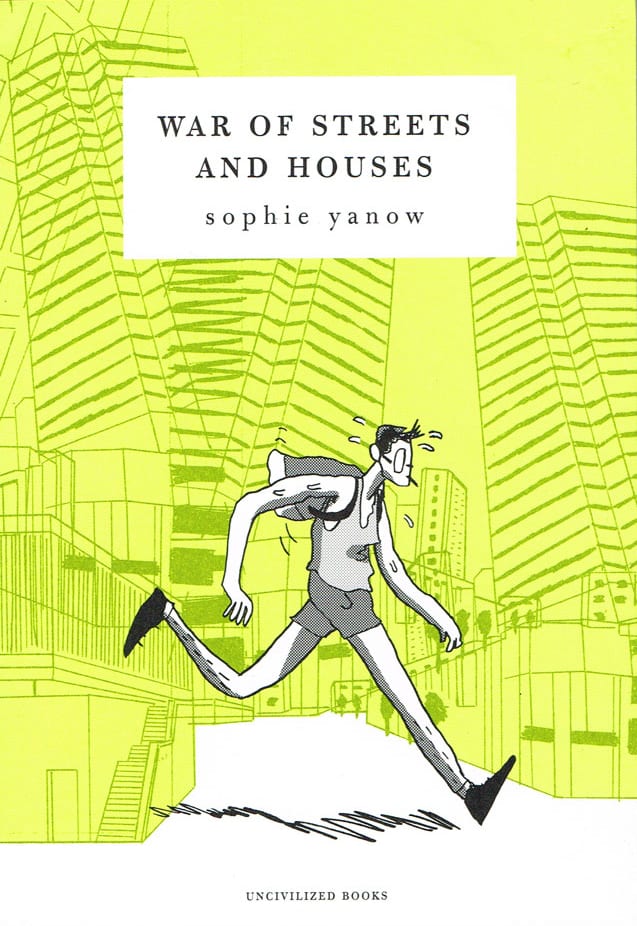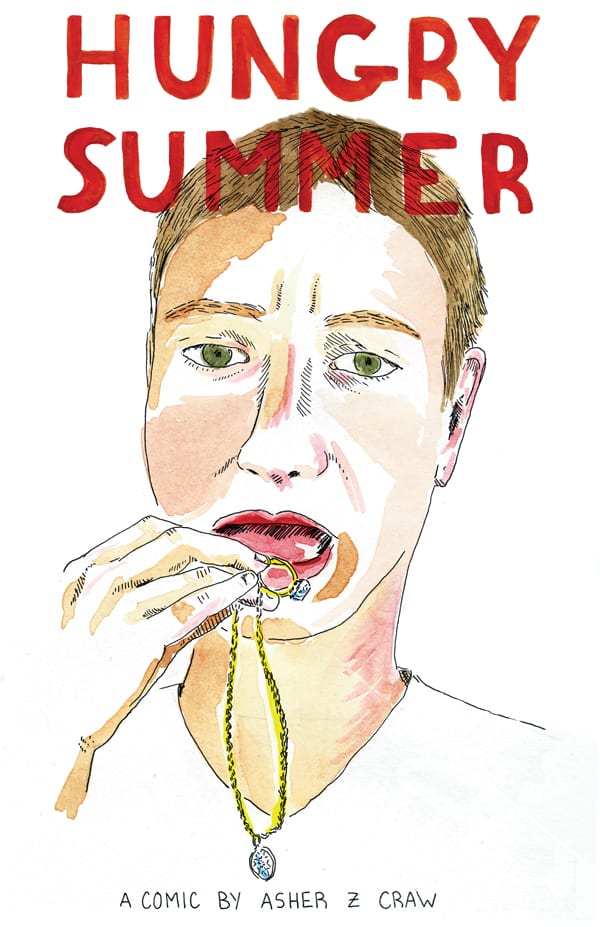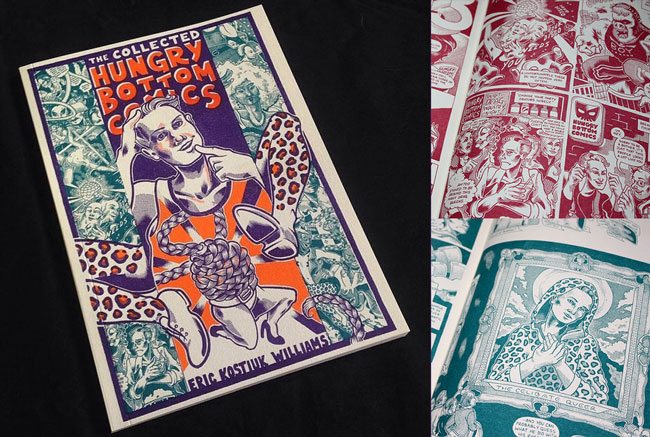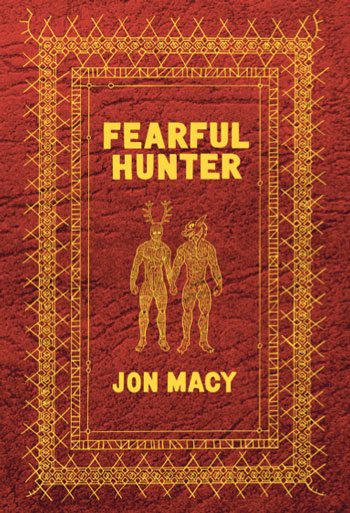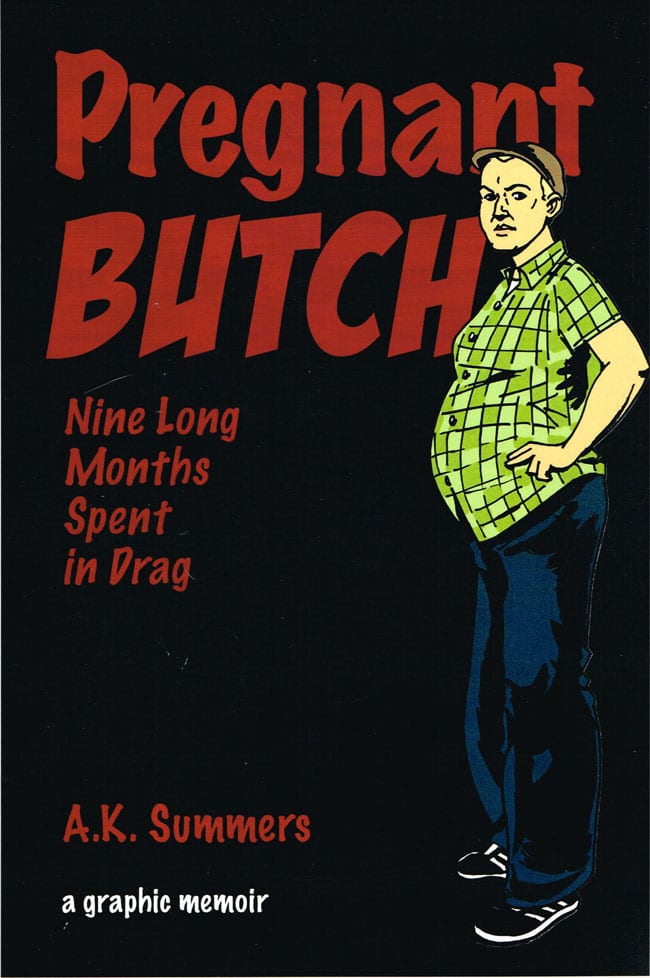No doubt about it, 2014 was a banner year for queer alternative/art comics. In this sub-scene of a sub-scene a wildly varied, thematically rich range of subject matter issued forth from alt-presses, micro-presses, and self-publishers. There was something for everyone, or at least a good number of everyones, queers and non-queers alike.
One hallmark of the year was the continued so-called Queering of the Mainstream (or Mainstreaming of the Queer), a phenomenon increasingly noted since the breakthrough of Alison Bechdel’s Fun Home in 2007. Justin Hall, in 2011's No Straight Lines: Four Decades of Queer Comics , asserted that queer comics had traditionally “existed in a parallel universe alongside the rest of comics,” but that just as queer culture in general had begun to leave the gay ghettos and spread into the larger culture, queer comics were beginning their own infiltration into the larger comics arena. I’d initially maintained a healthy skepticism to this notion; not questioning its veracity, but wary of the trend’s ability to make any but the smallest cracks in the glass ceiling against which so many of us queer cartoonists have bumped our heads over the years. I’ve since concluded that yes, this movement—this big amorphous queer thing—is having an impact as it continues to grow and spread itself around; to what degree remains to be seen.
For example: In the past twelve months, several important non-queer-specific alternative presses and micro-presses offered up books of explicitly gay/queer content to their readers. Compared to years past, this trickle of books seems to me like a flood. As I recall, in 2013 there were just two: Calling Dr. Laura by Nicole Georges (Mariner) and The Passion of Gengoroh Tagame (PictureBox). In 2014 there were:
- Pregnant Butch by AK Summers (Soft Skull Press), a whip-smart, wonderfully droll fictionalized account of the butch lesbian author's complicated pregnancy in the early aughts;
- On Loving Women by Diane Obomsawin (Drawn & Quarterly), a charming collection of true coming-out and first-love stories of various Canadian women, drawn in anthropomorphized form;
- Snackies by Nick Sumida (Youth in Decline), very funny satirical comics and stories from a distinctly gay millennial's perspective;
- 100 Crushes by Elisha Lim (Koyama Press), a sensitive, often fascinating collection of portraits, meditations, and memoirs ruminating variously on gender, masculinity/femininity, lesbianism, pronouns, and ethnicity; and
- Massive: Gay Erotic Manga and the Men Who Create It, edited by Anne Ishii and Graham Kolbeins, designed by Chip Kidd (Fantagraphics), a gorgeous, bear-sized omnibus (a follow-up to and expansion of The Passion of Gengoroh Tagame).
The span of these books is impressive: ranging from the crossover-friendly, delightfully demented humor of Snackies and the tender but unsentimental slices-of-life of On Loving Women to the thoughtful subject matter of 100 Crushes and the XXX porn of Massive. The fact that people of color authored three of these five books is equally significant.
The year also saw other important releases from non-queer presses that fall into a nebulous category I’ll call “Queer/Not Queer,” where the queer identity of the creator is not central to the work, yet informs it in other ways. (A great example is Andy Hartzell's brilliant pantomime opus from 2007, Fox Bunny Funny.) In War of Streets and Houses (Uncivilized Books) Sophie Yanow looks at events that took place during the 2012 student strikes in Montreal. The brutal police response prompts Yanow to examine ways in which urban planning has been calculated to give authorities the advantage in such uprisings. Yanow casually and occasionally mentions her queer outsider status, which lends her participation in the protests another dimension, a certain gravitas (she also acknowledges her white privilege). Whereas in Pregnant Butch A.K. Summers’ lesbian identity is obviously crucial to telling her tale, Yanow’s queerness is an added, appreciated detail, another important facet of her short but complex narrative.
Meanwhile, the hit book Megahex by Simon Hanselmann (Fantagraphics) features little to no orthodox "queer" action, yet when all is said and done the action remains pretty darn queer. There’s a depressed witch named Megg and her lover, Mogg, a horny male cat; their roommate, friend and victim Owl; and among the supporting characters there's Booger, who identifies as transgender (Hanselmann is known in real life as a cross-dresser). It all adds up to a definitely non-heteronormative and often hilarious, and sometimes touching, reading experience. The sequence where cat Mogg gives witch Megg an interspecies rim job has a transgressive quality, to be sure.
Another Queer/Not Queer title in an entirely different vein is Hungry Summer by Asher Z. Craw. The inaugural title of Sparkplug Books’ new Minis Series line, Summer is a strange, magical tale of a witch who in the course of the story renders an annoying, sexist frat boy invisible and gifts a helpful (possibly lesbian-identified) young woman the power to cough up jewels. Craw’s identity as a trans person illuminates much of his comics work, but thus far he has opted to explore the issue in a more metaphorical fashion. The poetry and economy of his narratives that won my heart in his debut minicomic Zebadiah is fully on display here.
Several other micropresses offered up their own queer titles. The Cruising Diaries, from longtime Bay Area scenester/zinester Janelle Hessig and the first release from her new press Gimme Action, is a gaspingly funny collection of writer Brontez Purnell's sexual escapades, illustrated by Hessig in her inimitable Peter Bagge-like, UG comics style. One of the two or three most purely sexual works among 2014’s titles, Cruising Diaries one-ups even Massive's big-dicked action by dint of Purnell’s real-life raunchy exploits. Most of the scenarios in Massive are clearly in the realm of sexual fantasy, whether science fiction-tinged tales like Gai Mizuki’s “Fantasy and Jump Rope” or surreal depictions like the sexual melee in a school hallway (with classes in session, mind you) in Seizoh Ebisubashi’s ”Mr. Tokugawa”. In contrast, Purnell’s kiss-and-tells have a gritty, almost scatological immediacy. Here is his description of a hook-up in a park, initiated randomly on a Tuesday morning: “I went to his house where he had pictures of his wife and kids everywhere and every solo-male jerk-off film ever. We spent three hours in the shower pissing on each other and he bought me a burrito later. PERFECT DATE.” While Massive is big, thick, and creamy, Diaries is down and filthily dirty.
Meanwhile, Colour Code, an independent print studio based in Toronto specializing in risographed works, released The Collected Hungry Bottom Comics, a bound reprint of three self-published minis by the very talented comics autobiographer Eric Kostiuk Williams. Williams, a 2013 Douglas Wright Award nominee, is every bit as intellectually rigorous as Elisha Lim in 100 Crushes. Sharing Lim's fascination with the social construction of the masculine and the feminine, Williams explores cultural preferences for masculinity and the psychic toll they take, particularly on effeminate men. He depicts with humor and eloquence the shame gay males perpetuate amongst themselves (with, for example, the ubiquitous “Straight-acting Seeking Same” line in personal ads). The comics of both Lim and Williams would make fine additions to any number of gender and/or queer studies syllabi.
Robyn Chapman's Paper Rocket Comics, a micropress with a particularly appealing handmade aesthetic, offered up Limp Wrist, another comic describing the burdens of gender and identity. Written by a trans woman named Scout Wolfcave and drawn by cartoonist Penina Gal, Limp Wrist is a deeply felt autobiographical mini describing in simple, forthright terms the anguish Wolfcave endured as an effeminate male-born individual, rejected by abusive parents and a society that fiercely enforces strict gender binaries. Her story is effectively captured in Gal's simple but bold and colorful drawings. In contrast to how Diane Obomsawin's use of stripped-down visuals and anthropomorphism in On Loving Women effectively add a degree of fantasy and romance to her book's traditional coming out stories, Gal’s cartoony anthropomorphized images make Wolfcave’s stark and painful narrative accessible without sacrificing any of its immediacy. Limp Wrist is a mini that packs a real punch.
There was lots of activity on the self-publishing front as well, both from already established creators and up-and-comers. Tony Breed, a double Ignatz nominee in 2011, successfully Kickstarted Everyone is Someone's Fetish, the fifth paperback collection of his popular webcomic "Finn and Charlie are Hitched". Breed’s quietly quirky sense of humor enlivens the traditional comic strip format, and his appealing characters are the kind of people you want to know in real life. Hazel Newlevant, the winner of the 2013 Prism Queer Press Grant, published If This Be Sin, a trio of stories concerning queer women in music in three different eras. There are biographical pieces about Gladys Bentley, the Harlem Renaissance blues singer; another concerning Wendy & Lisa, Prince’s backup singers from the '80s; and a slice of life piece set in modern day, about a young woman who enters a dance contest and becomes smitten with an alluring female partner. Newlevant draws these tales with sensitivity and an appealing, accessible style; she’s a real talent to watch. Meanwhile, Cathy G. Johnson, who won 2014’s Ignatz Award for Promising New Talent, published Dear Amanda, a follow-up to her powerful 2013 opus Jeremiah. Johnson’s new work is a delicate tale that artfully navigates romantic expectation and uncertainty between two women; an underlying theme is the power of language to either bridge or widen gaps between people.
Zan Christensen’s Northwest Press, the only queer-specific, North American general interest comics publisher, finished out its fourth year with two major releases: Jon Macy’s Fearful Hunter , the follow-up to his Lambda Award-winning Teleny and Camile, and my anthology QU33R, which features 33 contemporary cartoonists (several of whom are discussed here), and was this year’s recipient of the Ignatz Award for Outstanding Anthology or Collection. Fearful Hunter is Macy’s handsome, 280-page erotic fantasy romance about a sexy but sensitive young druid named Oisin (pronounced ah-sheen) who falls in love with a beautiful but emotionally vulnerable man-wolf named Byron. Macy explains what lies beneath his story’s lushly imagined landscape and swooning eroticism: “I feel it’s important to have sex portrayed in a sexual relationship. I believe that when we sanitize our love stories, we are telling the world and ourselves that there is something wrong with queer sex. When we self-censor out of fear that someone, somewhere, might be offended, we are saying we agree. It is also saying that that is all we deserve.”
Northwest Press has lately focused more attention on genre comic book series, like Leia Weathington's crossover hit, Bold Riley, a lesbian sword-and-sorcery fantasy adventure (three issues thus far) and Dash, from Dave Ebersole and Delia Gable, a queer take on the '40s private detective trope (two issues out with two more on the way). Another series, Rick Worley's A Waste of Time, is an angst-ridden, highly amusing amalgamation of autobiography and sociopolitical commentary along with a bit of soap opera, starring a big, horny, foul-mouthed rabbit as the author’s alter ego, supporting players like Prester, a fundamentalist teddy bear; his sort-of boyfriend, a robot named Ricketts; and Capitalist Pig, who is just that. The strip also features fantasy sequences with guest stars like Bill Watterson and Jim Davis (there are two issues to date plus a 2011 trade paperback). Worley, a true original, is a talented, very politically incorrect cartoonist who deserves more attention than he has received. Northwest Press is also publishing a long overdue, comprehensive compendium of Eric Orner's classic '90s gay male strip, The Completely Unfabulous Social Life of Ethan Green, due out in January 2015.
Speaking of 2015: how queer will it be? Although several of the mainstream presses I talk about here have told me they have no queer-themed books slated in the next twelve months, there are exciting major works on the horizon. From Fantagraphics in the spring, there's Ed Luce's much anticipated Wuvable Oaf collection, and in the fall, Class Photo, by veteran underground cartoonist and former editor of Gay Comix Robert Triptow. Ryan Sands of Youth in Decline is co-editing (with Michael DeForge) a new issue of the anthology Thickness that will include works by cartoonists of various sexual and gender identities. In choosing the contributors, Sands says he and DeForge purposely favored works that would depict a range of orientations, interactions, and genres. Some of the contributors include Edie Fake, HamletMachine, and Gengoroh Tagame, with a number of "non-heterosexual ‘erotic’ stories." Anna Bongiovanni, a dedicated twenty-something cartoonist and activist based in Minneapolis, is working on a book called Selfie, to be published by 2D Cloud. Selfie follows two scruffily appealing protagonists coming out as genderqueer, navigating their relationships, and “their struggle to find/be the queer utopia they are searching for.” Bongiovanni is part of a bright new generation of younger queer cartoonists, like Eisner-nominated Melanie Gillman and CCS graduates Laurel Lynn Leake and Sasha Steinberg.
Also coming down the pike from Pantheon, though at a still undetermined time, is Maurice Vellekoop's ambitious coming-of-age memoir about growing up with hardworking Calvinist parents and being influenced by a "wildly sophisticated, very out" art school professor. (Working title: I’m So Glad We Had This Time Together.) Vellekoop, a master illustrator and cartoonist, has never released something in long form and I'm So Glad, edited by Chip Kidd, promises to be a major publishing event.
Looking ahead, the vibe I'm getting is positive: queer books are being released in larger numbers by a greater diversity of publishers who believe in the work, perhaps placing artistic merit and/or universal appeal over possible marketplace limitations. The marketplace itself seems to be blurring in this ever-shifting cultural landscape as the Mainstream is Queered and Wuvable Oafs, Pregnant Butches, Hungry Bottoms and Loving Women find crossover success with greater ease than ever before.
Finally, perhaps the biggest news for 2015 is the Queers and Comics conference, to be held at the Center for Lesbian & Gay Studies (CLAGS) in New York City, May 7th and 8th. Featuring keynote speakers Alison Bechdel and Howard Cruse, these two days of panels, workshops, and presentations from creators, academics and writers, and an exhibition of queer cartoon art, it promises to up the ante for respectability—on our own terms, as it should be.
Cartoonists of all stripes have always had to maintain a certain scrappy attitude to get their work recognized, published, and distributed. That queer creators have gained increasing respect and exposure from outfits like Fantagraphics and Drawn & Quarterly is no small achievement. Ultimately, though, the responsibility to perpetuate and celebrate our art and culture remains with us, the creators of queer comics. In her introduction to Pregnant Butch, A.K. Summers cites her reasons for creating the work: “[it] is part of a long tradition of art whose purpose is to make the unseen visible. Now, it also seems important to me to pin down a particular moment in time, to document the second before the culture hit a reset button and attitudes flipped.” We—and here I’m talking about all of us in the comics community—have come a long way from the days when Gay Comix and LGBT newspapers provided the primary media outlets for the work of queer cartoonists, who received mostly benign neglect and/or outright dismissal elsewhere. Let’s pause to note this queer moment in time as we cast our eyes toward the future.



